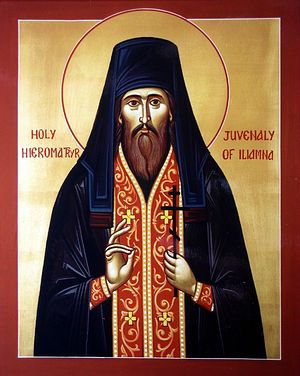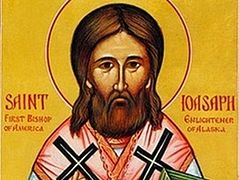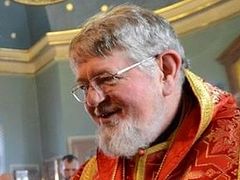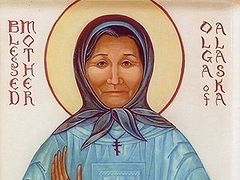Saint Juvenal, the Protomartyr of America, was born in 1761 in Nerchinsk, Siberia. His secular name was John Feodorovich Hovorukhin, and he was trained as a mining engineer. In a letter to Abbot Nazarius of Valaam (December 13, 1819), St Herman says that St Juvenal “had been an assistant at our monastery and was a former officer.”
After his wife died in 1791, John entered a monastery at St Petersburg (St Herman’s Letter of December 13, 1819) and was tonsured with the name Juvenal. Three years later, he went to Alaska as a missionary.
During 1794, the hieromonks Juvenal and Macarius spent two months in the area around Kodiak teaching the inhabitants about Christ and baptizing them. They traveled in small boats of hide in all sorts of weather, dividing up the territory among themselves. St Herman tells of a conversation he heard one day as he walked with the hieromonks to a small hill on the south side of the harbor. They sat down facing the sea, and spoke of various things. Soon they began to discuss where each of them should go to preach. Aflame with zeal and eager to set out on their journey, a friendly argument ensued between Fr Macarius and Fr Juvenal. Fr Macarius said he intended to go north to the Aleutian Islands, and then make his way to the Alaskan mainland, where the inhabitants had invited him to visit. The monks had a map of Captain Cook’s which indicated that some Russians were living near a certain river in that particular area, and Fr Macarius hoped to find them.
Fr Juvenal interrupted, saying that he believed that the Alaskan mainland was his territory. “I beg you to yield to me and not offend me in this,” he told Fr Macarius, “since the ship is leaving for Yakutan. I shall begin preaching in the south, proceeding north along the ocean, cross the Kenai peninsula, then from the port there I shall cross to Alaska.”
Fr Macarius became sorrowful and said, “No, Father. Do not restrict me in this way. You know the Aleutian chain of islands is joined to Alaska, therefore it belongs to me, and also the whole northern shore. As for you, the southern part of America is sufficient for your whole lifetime, if you please.”
As he listened to their apostolic fervor, St Herman says he “went from joy to rapture” (Letter to Abbot Nazarius, May 19, 1795).
In 1795, Father Juvenal baptized over 700 Chugatchi at Nushek, then he crossed Kenai Bay and baptized the local people there. In 1796, according to native oral tradition, St Juvenal came to the mouth of the Kuskokwim near the present village of Quinahgak, where he was killed by a hunting party (There is a forged diary attributed to Ivan Petroff which gives a slanderous version of Fr Juvenal’s death, and alleges that he was martyred at Lake Iliamna).
The precise reason for St Juvenal’s murder by the natives is not known. However, they later told St Innocent something about his death. They said that St Juvenal did not try to defend himself when attacked, nor did he make any attempt to escape. After being struck from behind, he turned to face his attackers and begged them to spare the natives he had baptized.
The natives told St Innocent that after they had killed St Juvenal, he got up and followed them, urging them to repent. The fell upon him again and gave him a savage beating. Once more, he got to his feet and called them to repentance. This happened several times, then finally the natives hacked him to pieces. Thus, the zealous Hieromonk Juvenal became the first Orthodox Christian in America to receive the crown of martyrdom. His unnamed guide, possibly a Tanaina Indian convert, was also martyred at the same time.
It is said that a local shaman removed St Juvenal’s brass pectoral cross from his body and attempted to cast a spell. Unexpectedly, the shaman was lifted up off the ground. He made three more tries with the same result, then concluded that there was a greater power than his own at work here. Years later, a man showed up at the Nushagak Trading Post wearing a brass pectoral cross exactly like the one worn by St Juvenal.
A column of light arose from his holy relics and reached up to Heaven. It is not known how long this phenomenon continued.
St Juvenal, in his tireless evangelization of the native peoples of Alaska, served the Church more than all the other missionaries combined.
Troparion — Tone 4
Today Alaska rejoices and America celebrates / for the New World has been sanctified by martyrdom. / Kodiak echoes with songs of thanksgiving, / Iliamna and Kenai observe the Festival of Faith. / The apostle and martyr Juvenaly is glorified / and Peter the Aleut is exalted by his voluntary sacrifice. / In their devotion and love for the Lord / they willingly endured persecution and death for the Truth. / Now in the Kingdom of Heaven they intercede for our souls.
Kontakion — Tone 4
Today Valaam joins Alaska in celebrating this joyous feast, / as her spiritual son Juvenaly embraces the New Martyr Peter with love. / Together they suffered for the Lord in America / and united the Old World with the New by their voluntary sacrifice. / Now forever they stand before the King of Glory and intercede for our souls.




